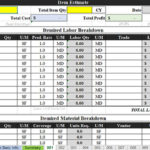A quantity surveyor plays a crucial range of roles in almost every construction process. Whether it is a large infrastructure project or small building construction work, the QS has a broad scope of duties and responsibilities in the construction phases.
The following are the roles of the quantity surveyor in each of these stages as follows.
1. Pre-construction stage
The QS examines the architect and engineers’ plans, analyse site conditions, distinguishes the expenses involved, and then sets a general assessed budget plan for each task in the project.
2. Design Phase
In the design stage, the quantity surveyor involves the design team and suggests practical solutions for turning the project economical within the project’s allotted budget, which is called value engineering.
3. Tendering Stage
In this stage, the QS advises on tendering and contractual plans considering the client’s needs and other data accessible from the designers. The QS also reports on the insurance and liabilities with client’s insurance advisers. The detailed and final tender estimate is prepared by the quantity surveyor with the project architect.
4. Tender Selection & Appraisal
At this phase, the QS advises shortlisting bidders and looking into the tender’s financial standing and experiences. He also advises on errors and negotiates offers—the final review of bid documents and recommendations for the best tender.
5. Construction Stage
During the construction phase, the QS monitors the project’s progress. He will get ready with suggestions and prepare bills for payments to contractors, subcontractors, and suppliers as per the agreement prerequisites. Also, QS evaluates expenses impacts when changes are happening in the project, i.e. design alteration, delays, and variations with contractors. Resolve disputes between clients, designers, contractors, subcontractors, and other related parties with projects.
6. Post Construction Stage
The QS prepares the statements for final accounts, which records the actual expenses that occurred in all areas of the employment in the project. Also, the documents required for the technical auditing are made available. Tax deduction policies and laws are considered and applied wherever needed.
Thus, these are the various key roles the quantity surveyor plays in each of the construction processes.



